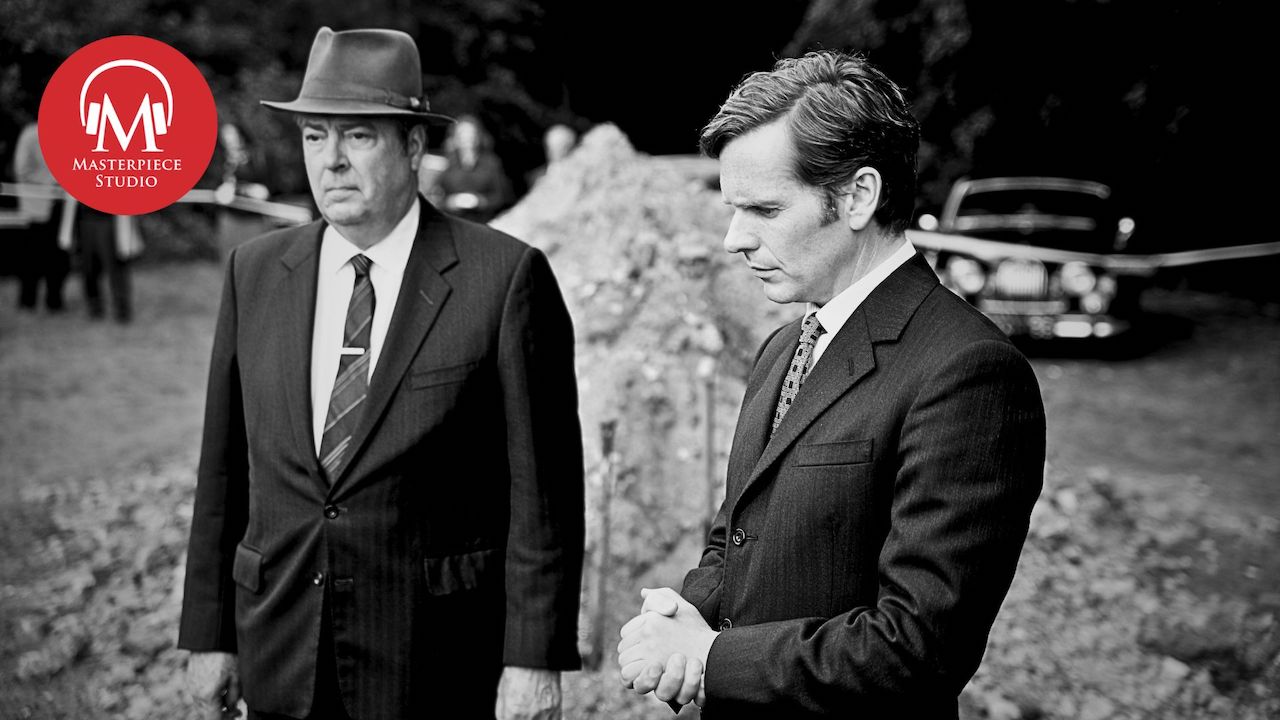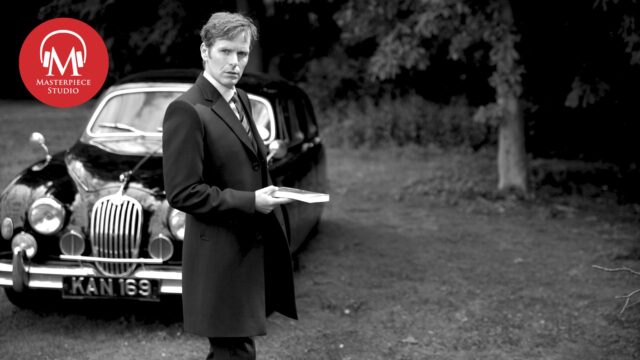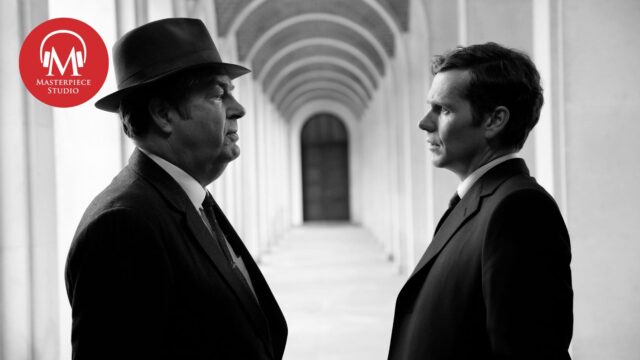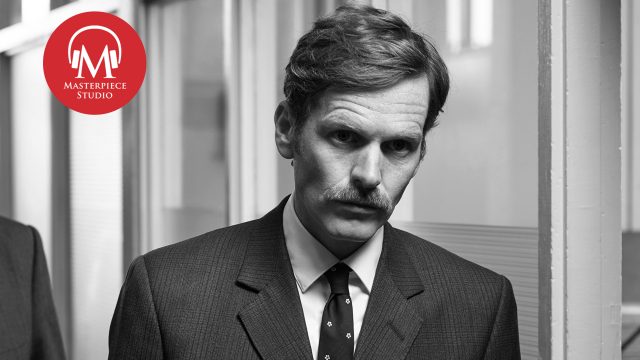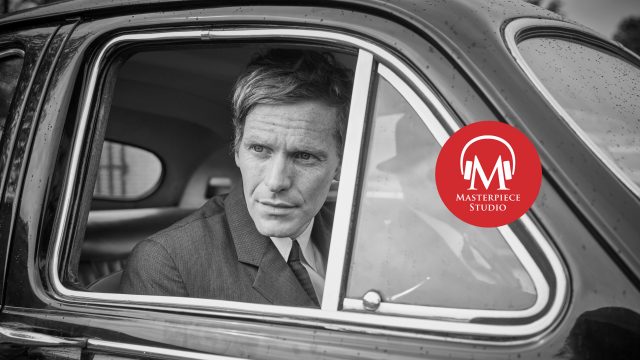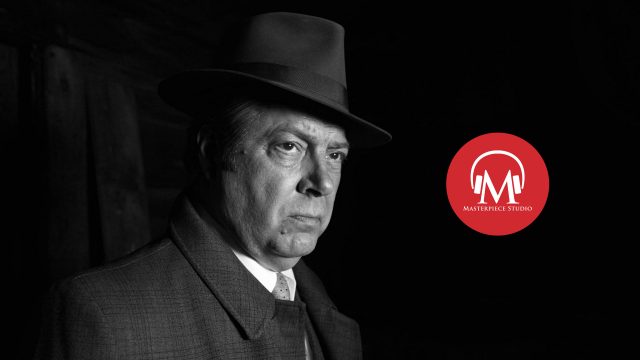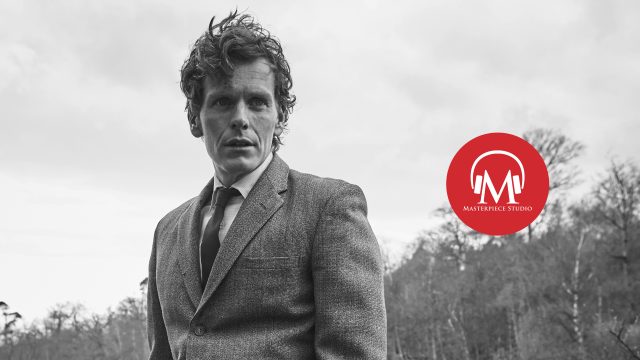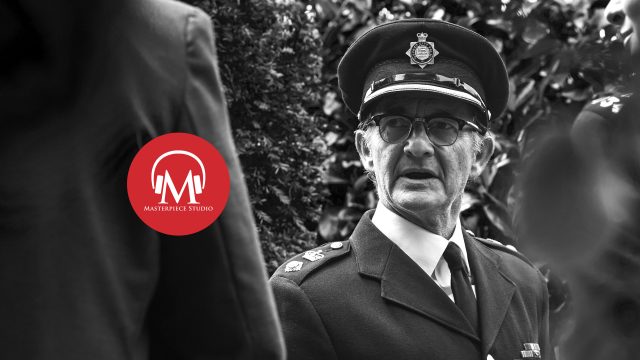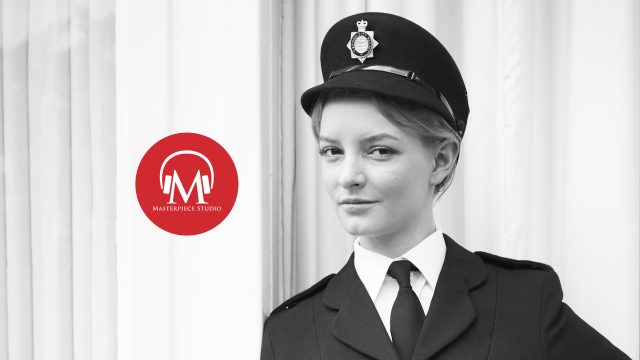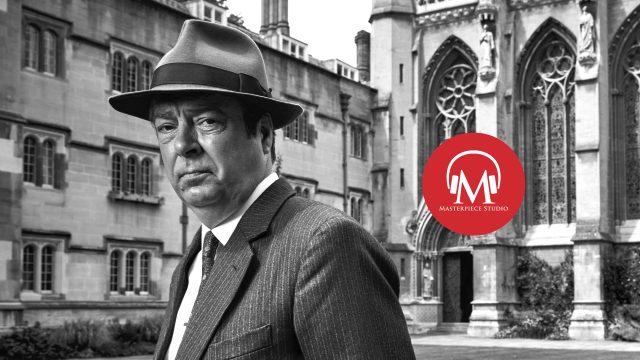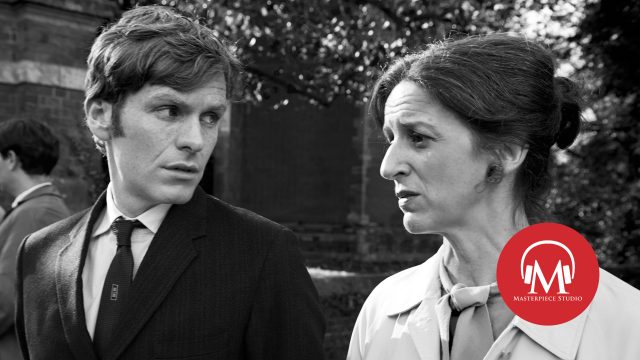This script has been lightly edited for clarity
Jace Lacob: I’m Jace Lacob, and you’re listening to MASTERPIECE Studio.
We arrive at last, to the final episode, of the final season, of Endeavour. As Episode Three opens, we’re greeted once again by the beautiful juxtaposition we’ve come to expect with this show — a bright sunny day, trees blowing in the wind… a most pleasant backdrop, for a most somber funeral.
CLIP
Preacher: Remember not the sins and offenses of my youth, but according to thy mercy, think thou upon me, oh Lord, for thy goodness.
Endeavour has been the story of what made Morse, Morse. And with one episode left, there are still many loose threads to tie up, stories to conclude, and of course, cases to solve.
CLIP
Morse: We believe the two bodies we’ve found so far to be those of Josiah Landesman and his former secretary, Brenda Lewis.
Jakes: And no Peter Williams?
Morse: No, not yet.
Another big question hanging in the balance is that of Morse and Joan. With Joan’s wedding fast approaching, will these two finally get the chance to be honest about their feelings before it’s too late? Or is Morse destined to a lonely, loveless life?
CLIP
Joan: You’re early.
Morse: Yeah, for once. You alright?
Joan: Yeah.
Marriage Officiant: Is this the lucky man?
Joan: No, this is Mr. Morse.
Morse: I’m the best man.
Marriage Officiant: Ah, well don’t worry. If the groom doesn’t turn up, we shant be calling you to step into the breach.
Shaun Evans joins the podcast to share his thoughts on the series finale, and how he prepared his Morse, of Endeavour, to hand off the baton to the other Morse, his older self, of Inspector Morse.
Jace Lacob: We are joined once again this week by Endeavour star, director and producer, Shaun Evans. Welcome.
Shaun Evans: Hey, Jace. How’s it going? Thanks for having me.
Jace Lacob: Thanks for joining us. Morse spends this final episode tying up loose ends; finally concluding the mess at Blenheim Vale, while also avoiding his duties as Best Man at Strange and Joan’s wedding. There’s a doggedness to Morse here, this sense of a tired, resolute quality to him that really positions him very close to the Morse of the future of Inspector Morse. What is your take on the final episode, the final Endeavour ever?
Shaun Evans: Well, my hope is that it’s emotionally, very satisfying. Aside and apart from the Blenheim Vale and the case, the case of the season, I suppose, and the case of the week, which are connected, I think emotionally, my hope is that we’d be able to tie up all of the elements that we’ve been presenting over the past couple of years, you know?
My take on it is that it’s a good ending, it’s a satisfying ending, I hope. I find it satisfying, so I hope that the audience does too.
Jace Lacob: I did. Blenheim Vale has hung over Endeavour for the better part of the show’s run, since that second series resulting in Morse’s wrongful imprisonment, Thursday being shot, the deaths of countless people. I mean, is it a victory, perhaps hard won with a huge cost, that Morse finally sees this investigation to its conclusion?
Shaun Evans: I think so, yes. It would’ve been deeply unsatisfying to have finished our work and never to return to it and to have left a loose end. So I think it is satisfying. And that’s both for me as a maker of it, but also I think for Morse as well, that would’ve been unsatisfying not to have got to the bottom of that.
But I think the most important thing, as I said, is the emotional tying up. In a way, the detective case is just a Trojan Horse, to get into the emotional lives of these characters. It has to be satisfying, of course, but it’s the relationships that people leave thinking about rather than the specifics of the case, I would say.
Jace Lacob: Almost like by design.
Shaun Evans: Almost by design.
Jace Lacob: Almost, almost by design. We touched on this when we talked at the beginning of this series, but what sort of conversations did you have specifically then with Russell Lewis about this final series, about where Morse would end up—that he’s sort of isolated and alone, he’s loveless, but determined, what were those conversations with Russell like?
Shaun Evans: Well, very interesting actually because we’d been speaking about it for a long time, the build up to the end. Russ had some very specific ideas about it, which hadn’t changed and which are really good ideas.
It’s unusual because the character preexists before we come to it, both in book form and obviously in the TV. And we know where we pick him up there. So in a way, we know where we have to drop him off at the end of our work together. And the question is, how do we get there and how do we get the audience there in a way that they don’t expect, that’s a surprise to them? If that makes any sense. So it’s the ‘how’, really, we get there, which was what all the conversations came about.
Jace Lacob: Endeavour breaks its own stylistic and narrative conventions in this final episode. It offers a daydream sequence at the wedding:
CLIP
Joan: Don’t tell me, work?
Morse: I apologize, Mrs….
Joan: You know, I don’t think you’ve ever called me by my name.
Morse: Have I not?
Joan: No.
Morse: Well, that’s probably for the best.
Joan: How’s that?
Morse: Because if I had said it once out loud, I think I might never have been able to stop. Truth is, I love you. I’ve loved you from the first moment you opened that door. I should’ve told you.
Jace Lacob: It’s beautiful and it’s heartbreaking, and it gives viewers what they’ve wanted this entire time before cruelly snatching it away. What did you make of this sequence?
Shaun Evans: I was a big champion of it. I thought it was really important. I can’t say why I felt it was important, I just did. For the character, but also for myself as an actor, it felt important to not leave this whole story with leaving these things unsaid.
And also my feeling was it’s important for the audience to see it. They’ve been with us for so long and sort of longing for this moment, that I think it’s important to deliver it and then also to take it away, you know?
So that’s one aspect of it. But in terms of breaking the stylistic rules, I think that was one of the things that we felt this season, especially, we’ve made this, now we can break it apart. And also we can be bold with it, you know?
Jace Lacob: You established the rules, so you have license to sort of break them then.
Shaun Evans: Exactly, yeah. And if you can’t do it now, then you then when, right?
Jace Lacob: I’m curious what it was like then, filming that sequence with Sarah Vickers. I mean, that passionate kiss and then that bittersweet hug as friends where Morse closes his eyes in heaven for just the briefest of moments before he then calls her Mrs. Strange. This is a character who has never called her by her first name. There’s always been this gulf between them. And then now she’s not even Miss Thursday anymore. She’s Mrs. Strange.
Shaun Evans: It’s brutal, isn’t it? It’s brutal. How was the scene to play? Do you know what, surprisingly easy to be honest with you, in as much as I think every fiber of his being had been longing for this moment since they first laid eyes on each other. And so it felt in a way, a very natural and a very easy thing to continue that, and to extend it to tell exactly how he feels.
And also then I suppose for myself as an actor, the big emotional scenes are the ones where you are really getting underneath the skin of the character in a moment of high stress and tension. Where they’re slightly out of control, I think are the most interesting moments where you push yourself as an actor, but the character is being pushed. And then I think in that, potentially something very interesting happens where that lack of control, you invite something else into it. And that’s for me I think, when it becomes very exciting as an actor, if that makes any sense.
Jace Lacob: It does, it’s interesting to me because this is a show that’s all about murder and mobsters and mystery, and this moment is perhaps the most dangerous moment in the show, where Endeavour perhaps lets his guard down, lets Joan in, only for us to find out that this wasn’t real, he can’t act on this moment, is brutal. It’s just brutal to watch in a really beautiful way. And I really applaud the show for going there because I don’t know that most shows would do that, would put their central character in such a heightened, as you say, emotional state, and then yank the rug out. So, Bravo.
Shaun Evans: Oh, thanks very much. Thanks very much. I also think sometimes we can err on the side of, taste makes us think, oh, you know, less is more and we don’t need to show too much. But for me personally, I didn’t want to leave anyone in any doubt as to exactly how he felt about this person.
It’s all well and good having sidelong glances in the mirror at someone, but it was important for me to leave the audience knowing this is where his heart is, and that cannot be.
MIDROLL
Jace Lacob: Morse brokers a deal to save Fred, Win and Sam so long as they disappear, likely ruining Sam’s dreams of joining the police in the process.
CLIP
Morse: Look, what happened with Lott and what happened in the yard, stays between us. But with this lot, it’s an eye for an eye, no matter how long it takes. Now, they’ve never seen you, but they know Sam. If he were to come back, if they should ever see him again, even you couldn’t defend him against that mob. He has to disappear.
Thursday: Yeah. And that’s on me. We’ll move away somewhere. Much further than Carshall. And Joanie and Jim?
Morse: No, they’re not connected. They’re safe.
Thursday: You’ll keep an eye?
Morse: Always.
Jace Lacob: How important was it to Morse that he engineer a way for Fred to escape?
Shaun Evans: Incredibly important I think, because therein is the difference between them. Given the choices that he’s presented with when he discovers what Thursday has done, and how his life is potentially then in danger moving forward, but also how disappointed I think he is as well with him in what he’s done and his actions. I just don’t think he can bear to see him as well anymore in the future that he is now dead to him as well, you know? So I think it’s twofold, yeah.
It’s messy, isn’t it? It’s like, it’s super messy, that moment, in a really good way, in the way that life is, you know? I know it’s incredibly heightened, but yeah, it’s a sort of puzzling moment in a way, if that makes any sense.
Jace Lacob: It is that final scene between the two of them:
CLIP
Morse: And what about Tomahawk? Did he have it coming? I told the bikers that he was a registered informant, Lott’s man on the inside. Hopefully that’ll buy some time that they won’t immediately try to find whoever really killed him. Not Sam, of course. Even though that’s his button. According to the barman, he was in no fit state to defend himself. There’s someone else, someone else who knew what he was doing, who had killed before, in the army, say. Someone who came home that night, unrecognizable, as the captain I would’ve followed into Hell.
Thursday: Morse…
Morse: I know thee not, old man.
Jace Lacob: Morse reveals he knows Fred killed Tomahawk to protect Sam. He gives Fred his money back and demands his revolver. It says so much about the relationship between these two men. What then do you make of the shift between Endeavour to Morse, just Morse?
Shaun Evans: Well, it’s huge, right? I mean, I think it’s huge. This person who had been something of a father figure to him and also had shown him what a man is and what a man could be. At least that’s what Endeavour puts on him, whether rightly or wrongly, then completely disappoints him.
And I think coming on the back of his disappointment with Joan, it’s about an emotional shut down. Because I think what I found interesting about it way back in the beginning is, it’s all well and good being embarrassed about your first name and so, not wanting people to call you by your Christian name, but there’s also something quite distancing about that, isn’t there? You’re keeping people at arms’ length. We were talking earlier about the manners of Miss Thursday or Mrs. Strange. And in a way, it’s the same with Thursday and he as well. As soon as Thursday reaches out and tries to use this Christian name, it’s a way of saying, you don’t deserve that anymore. We are done. This is done here. But also it’s a pulling up of the drawbridge for everyone in his life from there on in, I think.
And so it’s a huge moment. And in a way our work was trying to deliver this person from our beginning to this end now, who is emotionally a little more cut off than he would’ve been, and the reasons why he’s more emotionally cut off.
Jace Lacob: I love the final sequence at Blenheim Palace, where Morse drives his black Jaguar out of the gates and crosses both space and time with his older self in his maroon Jag. And we see their faces, young and old in their cars’ mirrors, and it’s a perfect bookend with the pilot episode. How satisfying was this as a moment for you, the changing of the guard here?
Shaun Evans: Yeah, incredibly satisfying. Incredibly satisfying, and I have so many feelings about it. I think from a story point of view, it’s satisfying for me. Like, is that it? It’s the last line, “Is that it?” Yeah, this is it, this is the end now, and then you swap over and hand over to someone else, that’s incredibly satisfying.
But for me, I suppose on a more emotional level, I remember thinking, God, that’s gone really fast. That’s gone so fast. I can remember when we did that in the pilot and now almost a decade has passed, and here we are swapping over. So I was struck by that, really.
Jace Lacob: In most television productions, scenes are shot out of order. But if I’m correct, this was actually the final scene shot on all of Endeavour for you, just you and the Jag.
Shaun Evans: Yeah, exactly. And it’s so interesting really because we had such a good following wind on this whole season. Of course, we had our challenges and difficulties; whenever you are making something, it’s difficult, but we had a really good following wind on this. And that scene wasn’t supposed to be at the end.
About 10 days previous we were supposed to shoot that. It was a beautiful day. We had Blenheim Palace booked and the car arrived. And the car wouldn’t start. So we had to stand down that day, put the car into the garage, and then do an extra day. Now, that really played, I think, into our favor, but certainly into mine because it was a moment to say goodbye to all of my fellow cast members on a daily basis. And then the final beat of the story was myself driving around alone in the Jag before handing it over.
And I can specifically remember actually as we were driving up and down, up and down that big, long passage, the sun was setting in the distance. And I thought, yeah, we’ve done this now. It was a very satisfying, solitary moment—gentle, but grateful letting go of it.
Jace Lacob: So I have to ask, because you filmed 36 Endeavour feature length installments. This is a massively singular work. If I’ve done my math right, that’s 3,240 minutes of screen time as this one character. It’s a tough question with that huge of a production, but what went through your head then? What did you do when they said, “That’s a wrap on Endeavour for Shaun Evans.“?
Shaun Evans: I felt, I suppose, in the car like I said, I felt it was the right time. And it felt like a very special moment. But it was difficult you know, because you’re doing your work and it was a way of saying goodbye. It’s kind of complicated and it’s messy. I don’t fully understand it myself, but it felt really right. And to be honest, it didn’t feel sad. It just felt like something really incredible was coming to an end and it was the right time that it come to an end and. It’s an extraordinary feeling to think that you can do that, be in that position without any regrets and without saying, oh, I wish that we would’ve done this, or, I wish that I would’ve tried harder this day or that day, or whatever. I don’t feel that way. I feel like that was a really strong piece of work and it’s for the most part, exactly how I intended. And that’s an incredible feeling that I feel very grateful for.
So the driving up and down, that’s kind of how I felt as it finished. And then I remember Kate, the director, she came over and said, do you want to do any more because we’re about to finish? And I was like, no, I think we’re good. So then we got in the car and we had a glass of champagne and that was the end. Then we all went our separate ways. Pretty strange kind of anti-climax, but kind of perfect as well. I don’t know, melancholy, and everything like the show, I guess.
Jace Lacob: Melancholic, messy, perfect.
Shaun Evans: Yeah. But grateful as well, but grateful too.
Jace Lacob: Shaun Evans, thank you so very much for over a decade as Endeavour Morse. Thank you.
Shaun Evans: Thank you very much. Thanks Jace.
And with that final glance in the mirror across time, we say goodbye to Endeavour and to Morse, both young and old. But don’t fret Mystery fans: there are other mysteries to be solved, in other university towns across Britain…
CLIP
Will Davenport: When the knights of old rode out on their steeds, they upheld ideas of courage, courtesy, and chivalry.
Mrs. C: Of all the indignities!
Will Davenport: The steeds may have changed, but the young men before us can still represent those same ideals. Now, some of you held less positive opinions when you first heard their bikes racing through the village. But I ask you to remember another biker who rode in here four years ago full of bravado and not always enough common sense, and in time, you welcomed me into this community.
Season Eight of Grantchester begins Sunday, July 9th on MASTERPIECE, on PBS.








